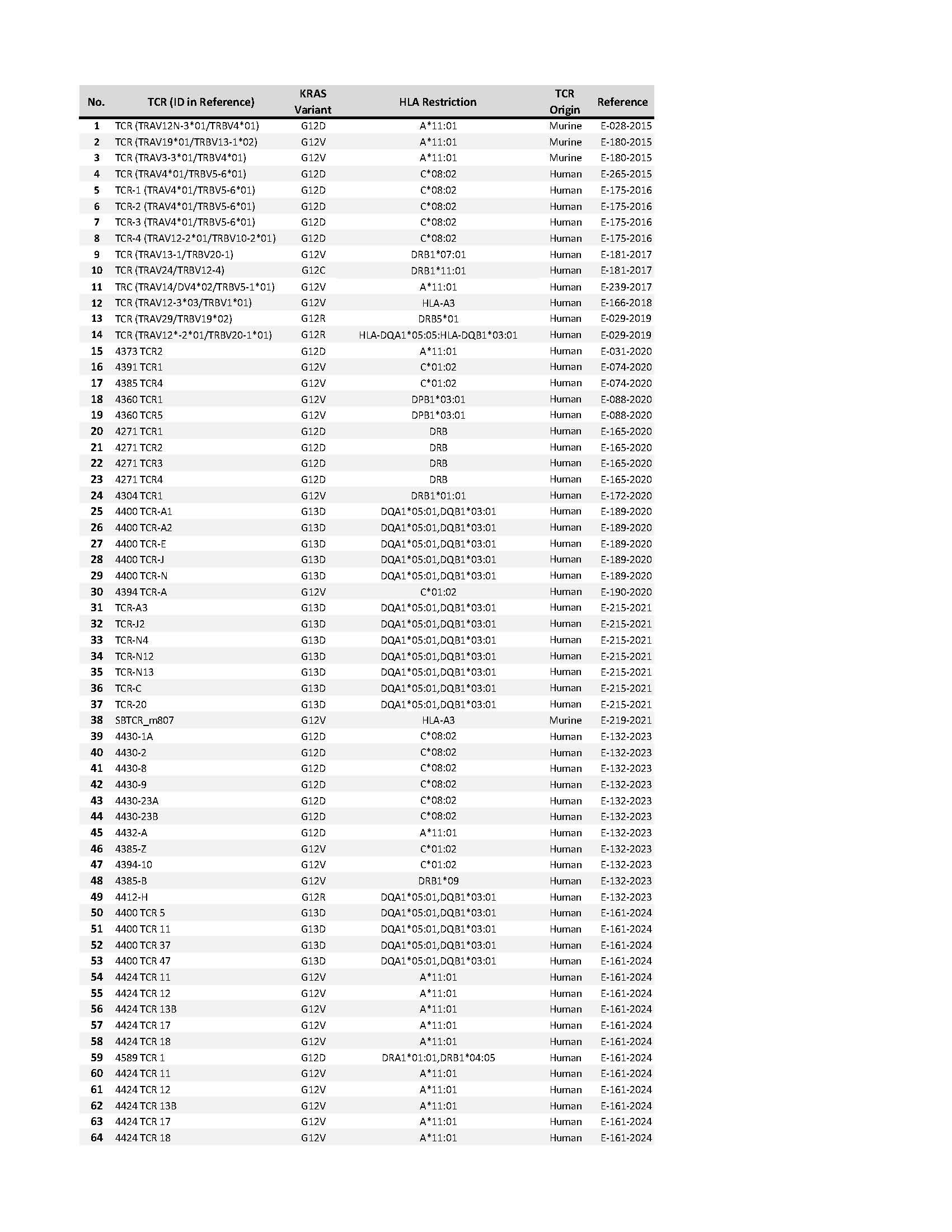T Cell Receptors Targeting KRAS Mutants for Cancer Immunotherapy/Adoptive Cell Therapy
Mutations in the Kirsten rat sarcoma viral oncogene homolog (KRAS) gene are among the most common oncogenic drivers in human cancers, affecting nearly a third of all solid tumors. Point mutations in the KRAS gene most frequently affect amino acid position 12, resulting in the substitution of the native glycine (G) residue for other amino acids (e.g., aspartic acid (D), valine (V), cysteine (C) or arginine (R)). The mutations in KRAS occur early in the process of carcinogenesis, and only tumor cells express driver mutations, making them an attractive cancer-specific therapeutic target. However, despite decades of research into the signaling of mutated KRAS and druggability of these mutations with selective inhibitors, no effective therapy has been developed for these common mutated KRAS-driven cancers.
T cell receptors (TCRs) are proteins expressed on the cell surface of T lymphocytes that can recognize peptide antigens from infected and malignant cells in the context of human leukocytes antigen (HLA) molecules with exquisite specificity. Subsequent T cell activation leads to an immune response which aims to eliminate the abnormal cells. T lymphocytes that naturally lack specificity for a tumor antigen can be equipped to express a tumor antigen-specific TCR using genetic engineering. Adoptive transfer of these tumor antigen-specific TCR-engineered T cells into patients with cancer has demonstrated to be a promising cancer treatment strategy.
Scientists at the NIH identified a collection of TCRs that specifically recognize mutated KRAS variants (Table 1). These variants cover the most common KRAS driver mutations expressed by a variety of epithelial cancers, including pancreatic, colorectal and lung cancer. The mutated KRAS variants are recognized by the TCRs in the context of specific Class I/Class II HLA alleles. These TCRs are expected to eliminate human cancer cells that express both the appropriate mutated KRAS variant and HLA molecule upon adoptive transfer into patients with cancer. Furthermore, these TCRs can be used for a variety of other experimental therapeutic, diagnostic and research applications.
Table 1: Collection of mutated KRAS TCRs
Table 2: Priority Patent Filings by Invention Reference1.jpg)
Competitive Advantages:
- Highly expressed target antigens: mutated KRAS variants are frequently expressed by the most common epithelial cancers, including pancreatic, colorectal and lung cancer
- Cancer-specific driver mutations: mutated KRAS variants are solely expressed by cancer cells, and not by healthy tissues
- Variety of HLA-restriction elements: extends the applicability of TCRs as they recognize mutated KRAS variants in the context of multiple HLA molecules
Commercial Applications:
- A component of a combination immunotherapy aimed at targeting mutated KRAS-driven cancers
- An in vitro diagnostic tool to screen for cells expressing mutated KRAS in antigen detection assays
- A research tool to investigate signaling in mutated KRAS antigen expressing cells
- Use of portions of the TCRs in chimeric proteins for research and therapeutic purposes in mutated KRAS-driven cancers


